- Home
- Roger Zelazny
Isle Of The Dead Page 3
Isle Of The Dead Read online
Page 3
Kathy _had_ seen me, within the fabric of my vision, which meant that there might be a chance ...
I turned on the screen and regarded the spirals of light, moving in both clockwise and counterclockwise directions about a point directly before me. These were the stars, visible only in this fashion, there, on the underside of space. As I hung there and the universe moved about me, I felt the decades' layers of fat that padded my soul's midsection catch fire and begin to burn. The man I had worked so hard at becoming died then, I hope, and I felt that Shimbo of Darktree Tower, Shrugger of Thunders, still lived.
I watched the spinning stars, grateful, sad and proud, as only a man who has outlived his destiny and realized he might yet forge himself another, can be.
After a time, the whirlpool in the sky sucked me down to sleep's dark center, dreamless and cool, soft and still, like the Valley of Shadows perhaps.
* * *
It was as two weeks' time before Lawrence Conner brought his _Model T_ to berth on Aldebaran V, which is called Driscoll, after its discoverer. It was as two weeks inside the _Model T_, though no time at all passed during phase. Don't ask me why, please. I don't have time to write a book. But had Lawrence Conner decided to turn around and head back for Homefree, he could have enjoyed another two weeks of calisthenics, introspection and reading and quite possibly have made it back on the afternoon of the same day Francis Sandow had departed, doubtless pleasing the wildlife no end. He didn't, though. Instead, he helped Sandow nail down a piece of the briar business, which he didn't really want, just to keep up appearances while he examined the puzzle-pieces he'd found. Maybe they were pieces from several different puzzles, all mixed together. There was no way of telling.
I wore a light tropical suit and sunglasses, for the yellow sky had in it only a few orange-colored clouds and the sun beat waves of heat about me, and they broke upon the pastel pavements where they splashed and rose in a warm, reality-distorting spray. I drove my rented vehicle, a slip-sled, into the art colony of a city called Midi, a place too sharp and fragile and necessarily beside the sea for my liking--with nearly all its towers, spires, cubes and ovoids that people call home, office, studio, or shop built out of that stuff called glacyllin, which may be made transparent in a colorless or tinted fashion and opaqued at any color, by means of a simple, molecule-disturbing control--and I sought out Nuage, a street down by the waterfront, driving through a town that constantly changed Lolor about me, reminding me of molded jello--raspberry, strawberry, cherry, orange, lemon and lime--with lots of fruits inside.
I found the place, at the old address, and Ruth had been right.
It had changed, quite a bit. It had been one of the few strongholds against the creeping jello that ate the city, back when we had lived there together. Now it, too, had succumbed. Where once there had been a high, stucco wall enclosing a cobbled courtyard, a black iron gate set within its archway, a hacienda within, sprawled about a small pool where the waters splashed sun-ghosts on the rough walls and the tiles, now there was a castle of jello with four high towers. Raspberry, yet.
I parked, crossed a rainbow bridge, touched the announcement-plate on the door.
"This home is vacant," reported a mechanical voice through a concealed speaker.
"When will Miss Laris be back?" I asked.
"This home is vacant," it repeated. "If you are interested in purchasing it, you may contact Paul Glidden at Sunspray Realty, Incorporated, 178 Avenue of the Seven Sighs."
"Did Miss Laris leave a forwarding address?"
"No."
"Did she leave any messages?"
"No."
I returned to the slip-sled, raised it onto an eight-inch cushion of air and sought out the Avenue of the Seven Sighs, which had once been called Main Street.
He was fat and lacking in hair, except for a pair of gray eyebrows about two inches apart, each thin enough to have been drawn on with a single pencil-stroke, high up there over eyes slate-gray and serious, higher still above the pink catenary mouth that probably even smiled when he slept, there, under the small, upturned thing he breathed through, which looked even smaller and more turned-up because of the dollops of dough his cheeks that threatened to rise even further and engulf it completely, along with all the rest of his features, leaving him a smooth, suffocating lump (save for the tiny, pierced ears with the sapphires in them), turning as ruddy as the wide-sleeved shirt that covered his northern hemisphere, Mister Glidden, behind his desk at Sunspray, lowering the moist hand I had just shaken, his Masonic ring clicking against the ceramic sunburst of his ashtray as he picked up his cigar, in order to study me, fish-like, from the lake of smoke into which he submerged.
"Have a seat, Mister Conner," he chewed. "What have I got that you want?"
"You're handling Ruth Laris' place, over on Nuage, aren't you?"
"That's right. Think you might want to buy it?"
"I'm looking for Ruth Laris," I said. "Do you know where she's moved?"
A certain luster went out of his eye.
"No," he said. "I've never met Ruth Laris."
"She must want you to send the money someplace."
"That's right."
"Mind telling me where?"
"Why should I?"
"Why not? I'm trying to locate her."
"I'm to deposit in her account at a bank."
"Here in town?"
"That is correct. Artists Trust."
"But she didn't make the arrangements with you?"
"No. Her attorney did."
"Mind telling me who he is?"
He shrugged, down there in his pool. "Why not?" he said. "Andre DuBois, at Benson, Carling and Wu. Eight blocks north of here."
"Thanks."
"You're not interested in the property then, I take it?"
"On the contrary," I said. "I'll buy the place, if I can take possession this afternoon--and if I can discuss the deal with her attorney. How does fifty-two thousand sound?"
Suddenly he was out of his pool.
"Where may I call you, Mister Conner?"
"I'll be staying at the Spectrum."
"After five?"
"After five is fine."
So what to do?
First, I checked in at the Spectrum. Second, using the proper code, I contacted my man on Driscoll to arrange for the necessary quantity of cash to be available to Lawrence Conner for the purchase. Third, I drove down to the religious district, parked the sled, got out, began walking.
I walked past shrines and temples dedicated to Everybody, from Zoroaster to Jesus Christ. I slowed when I came to the Pei'an section.
After a time, I found it. All there was above the ground was an entranceway, a green place about the size of a one-car garage.
I passed within and descended a narrow stairway.
I reached a small, candle-lit foyer and moved on through a low arch.
I entered a dark shrine containing a central altar decked out in a deep green, tiers of pews all about it.
There were hundreds of stained glassite plates on all five walls, depicting the Pei'an deities. Maybe I shouldn't have gone there that day. It had been so long.
There were six Pei'ans and eight humans present, and four of the Pei'ans were women. They all wore prayerstraps.
Pei'ans are about seven feet tall and green as grass. Their heads look like funnels, flat on top, their necks like the necks of funnels. Their eyes are enormous and liquid green or yellow. Their noses are flat upon their faces--wrinkles parenthesizing nostrils the size of quarters. They have no hair whatsoever. Their mouths are wide and they don't really have any teeth in them, per se. Like, I guess the best example is an elasmobranch. They are constantly swallowing their skins. They lack lips, but their dermis bunches and hardens once it goes internal and gives them horny ridges with which to chew. After that, they digest it, as it moves on and is replaced by fresh matter. However this may sound to someone who has never met a Pei'an, they are lovely to look at, more graceful than cats, older
than mankind, and wise, very. Other than this, they are bilaterally symmetrical and possess two arms and two legs, five digits per. Both sexes wear jackets and skirts and sandaIs, generally dark in color. The women are shorter, thinner, larger about the hips and chests than the men-- although the women have no breasts, for their young do not nurse, but digest great layers of fat for the first several weeks of their lives, and then begin to digest their skins. After a time, they eat food, pulpy mashes and seastuff mainly. That's Pei'ans.
Their language is difficult. I speak it. Their philosophies are complex. I know some of them. Many of them are telepaths, and some have other unusual abilities. Me, too.
I seated myself in a pew and relaxed. I draw a certain psychic strength from Pei'an shrines, because of my conditioning in Megapei. The Pei'ans are exceedingly polytheistic. Their religion reminds me a bit of Hinduism, because they've never discarded anything--and it seems they spent their entire history accumulating deities, rituals, traditions. Strantri is what the religion is called, and over the years it has spread considerably. It stands a good chance of becoming a universal religion one day because there's something in it to satisfy just about anybody, from animists and pantheists through agnostics and people who just like rituals. Native Pei'ans only constitute around ten percent of the Strantrians now, and theirs will probably be the first large-scale religion to outlive its founding race. There are fewer Pei'ans every year. As individuals, they have godawful long lifespans, but they're not very fertile. Since their greatest scholars have akeady written the last chapter in the immense _History of Pei'an Culture_, in 14,926 volumes, they may have decided that there's no reason to continue things any further. They have an awful lot of respect for their scholars. They're funny that way.
They had a galactic empire back when men were still living in caves. Then they fought an ages-long war with a race which no longer exists, the Bahulians--which sapped their energies, racked their industries and decimated their number. Then they gave up their outposts and gradually withdrew to the small system of worlds they inhabit today. Their home world--also called Megapei--had been destroyed by the Bahulians, who by all accounts were ugly, ruthless, vicious, fierce and depraved. Of course, all these accounts were written by the Pei'ans, so I guess we'll never know what the Bahulians were really like. They weren't Strantrians, though, because I read somewhere that they were idolators.
On the side of the shrine opposite the archway, one of the men began chanting a litany that I recognized better than any of the others, and I looked up suddenly to see if it had happened.
It had.
The glassite plate depicting Shimbo of Darktree, Shrugger of Thunders, was glowing now, green and yellow.
Some of their deities are Pei'apomorphic, to coin a term, while others, like the Egyptians', look like crosses between Pei'ans and things you might find in a zoo. Still others are just weird-looking. And somewhere along the line, I'm sure they must have visited the Earth, because Shimbo is a man. Why any intelligent race would care to make a god of a savage is beyond me, but there he stands, naked, with a slight greenish cast to his complexion, his face partly hidden by his upraised left arm, which holds a thunder cloud in the midst of a yellow sky. He bears a great bow in his right hand and a quiver of thunderbolts hangs at his hip. Soon all six Pei'ans and the eight humans were chanting the same litany. More began to file in through the door. The place began to fill up.
A great feeling of light and power began in my middle section and expanded to fill my entire body.
I don't understand what makes it happen, but whenever I enter a Pei'an shrine, Shimbo begins to glow like that, and the power and the ecstasy is always there. When I completed my thirty-year course of training and my twenty-year apprenticeship in the trade that made me my fortune, I was the only Earthman in the business. The other worldscapers are all Pei'ans. Each of us bears a Name--one of the Pei'an deities'--and this aids us in our work, in a complex and unique fashion. I chose Shimbo--or he chose me--because he seemed to be a man. For so long as I live, it is believed that he will be manifest in the physical universe. When I die, he returns to the happy nothing, until another may bear the Name. Whenever a Name-bearer enters a Pei'an shrine, that deity is illuminated in his place--in every shrine in the galaxy. I do not understand the bond. Even the Pei'ans don't, really.
I had thought that Shimbo had long since forsaken me, because of what I had done with the Power and with my life. I had come to this shrine, I guess, to see if it was true.
I rose and made my way to the archway. As I passed through it, I felt an uncontrollable desire to raise my left hand. Then I clenched my fist and drew it back down to shoulder level. As I did, there came a peal of thunder from almost directly overhead.
Shimbo still shone upon the wall and the chanting filled my head as I walked up the stairway and out into the world where a light rain had begun to falL
II
Glidden and I met in DuBois' office at 6:30 and concluded the deal, for fifty-six thousand. DuBois was a short man with a weatherbeaten face and a long shock of white hair. He'd opened his office at that hour because of my insistence on dealing that afternoon. I paid the money, the papers were signed, the keys were in my pocket, hands were shaken all around and the three of us departed. As we walked across the damp pavement toward our respective vehicles, I said, "Damni I left my pen on your desk, DuBois!"
"I'll have it sent to you. You're staying at the Spectrum?"
"I'm afraid I'll be checking out very shortly."
"I can send it to the place on Nuage."
I shook my head. "I'll be needing it tonight."
"Here. Take this one." He offered me his own.
By then Glidden had entered his vehicle and was out of earshot. I waved to him, then said, "That was for his benefit. I want to speak with you in private."
The squint that suddenly surrounded his dark eyes removed their look of incipient disgust and replaced it with one of curiosity.
"All right," he said, and we reentered the building and he unlocked his office door again.
"What is it?" he asked, reassuniing the padded chair behind his desk.
"I'm looking for Ruth Laris," I said.
He lit a cigarette, which is always a good way to buy a little thinking time.
"Why?" he asked.
"She's an old friend. Do you know where she is?"
"No," he said.
"Isn't it a trifle--unusual--to conserve assets in this quantity for a person whose whereabouts you don't even know?"
"Yes," he said, "I'd say so. But that is what I've been retained to do."
"By Ruth Laris?"
"What do you mean by that?"
"Did she retain you personally, or did somebody else do it on her behalf?"
"I don't see that this is any business of yours, Mister Conner. I believe I am going to call this conversation to a close."
I thought a second, made a quick decision.
"Before you do," I said, "I want you to know that I bought her house only to search it for clues as to her whereabouts. After that, I'm going to indulge a whim and convert it into a hacienda, because I don't like the architecture in this city. What does that indicate to you?"
"That you're something of a nut," he observed.
I nodded and added, "A nut who can afford to indulge his whims. Therefore a crackpot who can cause a lot of trouble. What's _this_ building worth? A couple million?"
"I don't know." He looked a little uneasy.
"What if someone bought it for an apartment building and you had to go looking for another office?"
"My lease would not be that easy to cancel, Mister Conner."
I chuckled. "... And then," I said, "you were suddenly to find yourself the subject of an inquiry by the local Bar Association?"
He sprang to his feet.
"You _are_ a madman."
"Are you sure? I don't know what the charges would be," I said, "yet. But you know that even an inquiry would give you some trou
ble--and then if you started running into difficulties finding another place ..." I didn't like doing things this way, but I was in a hurry. So, "Are you sure? Are you very sure that I'm a madman?" I finished.
Then, "No," he said, "I'm not."
"Then, if you've nothing to hide, why not tell me how the arrangements were made? I'm not interested in the substance of any privileged communications, simply the circumstances surrounding the house's being put up for sale. It puzzles me that Ruth didn't leave a message of any sort."
He leaned his head against the back of his chair and studied me through smoke.
"The arrangements were made by phone--"
"She could have been drugged, threatened ..."
"That is ridiculous," he said. "What is your interest in this, anyway?"
"Like I said, she's an old friend."
His eyes widened and then narrowed. A few people still knew who one of Ruth's old friends had been.
"... Also," I continued, "I received a message from her recently, asking me to come see her on a matter of some urgency. She is not here and there is no message, no forwarding address. It smells funny. I am going to find her, Mister DuBois."

 Seven Tales in Amber
Seven Tales in Amber Frost and Fire
Frost and Fire Doorways in the Sand
Doorways in the Sand Unicorn Variation
Unicorn Variation A Night in the Lonesome October
A Night in the Lonesome October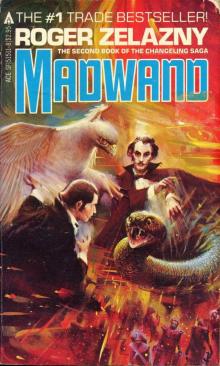 Madwand
Madwand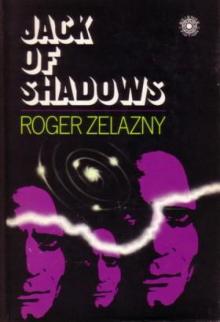 Jack Of Shadows
Jack Of Shadows Lord of Light
Lord of Light The Doors of His Face, The Lamps of His Mouth and Other Stories
The Doors of His Face, The Lamps of His Mouth and Other Stories Guns Of Avalon tcoa-2
Guns Of Avalon tcoa-2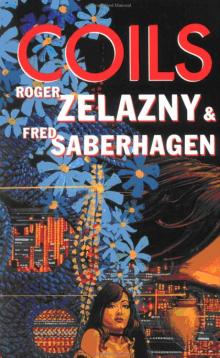 Coils
Coils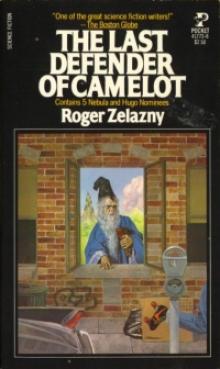 The Last Defender Of Camelot
The Last Defender Of Camelot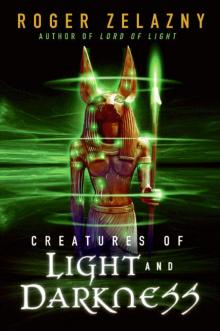 Creatures of Light and Darkness
Creatures of Light and Darkness This Immortal
This Immortal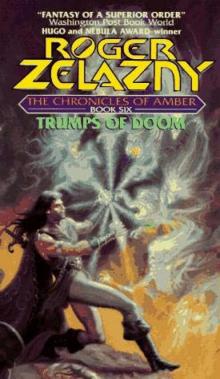 Trumps of doom tcoa-6
Trumps of doom tcoa-6 The Dream Master
The Dream Master The Complete Dilvish, The Damned
The Complete Dilvish, The Damned Nine Princes in Amber
Nine Princes in Amber If at Faust You Don't Succeed
If at Faust You Don't Succeed Here there be dragons
Here there be dragons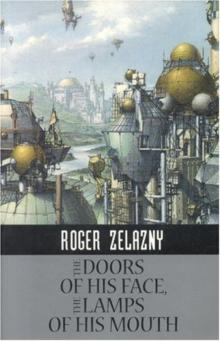 The Doors Of His Face, The Lamps Of His Mouth
The Doors Of His Face, The Lamps Of His Mouth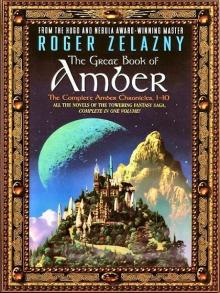 The Great Book of Amber - Chronicles 1-10
The Great Book of Amber - Chronicles 1-10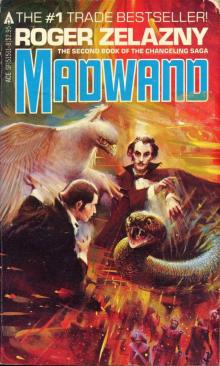 Madwand (Illustrated)
Madwand (Illustrated)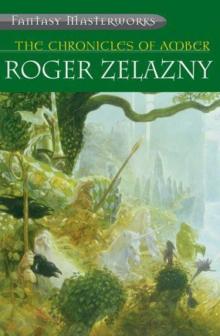 The Chronicles of Amber
The Chronicles of Amber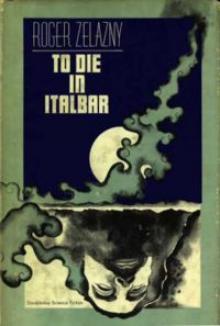 To Die In Italbar
To Die In Italbar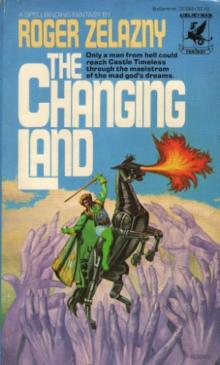 The Changing Land
The Changing Land The Furies
The Furies Nine Princes In Amber tcoa-1
Nine Princes In Amber tcoa-1 Last Of The Wild Ones
Last Of The Wild Ones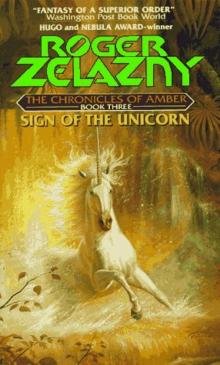 Sign of the Unicorn tcoa-3
Sign of the Unicorn tcoa-3 My Name is Legion
My Name is Legion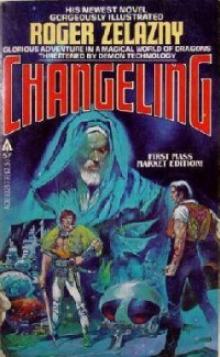 Wizard World 1: Changeling
Wizard World 1: Changeling Changeling
Changeling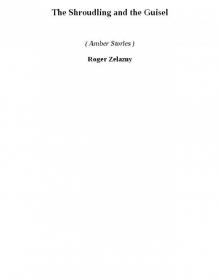 The Shroudling and the Guisel (amber stories)
The Shroudling and the Guisel (amber stories)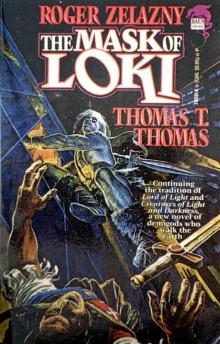 The Mask of Loki
The Mask of Loki A Farce To Be Reckoned With
A Farce To Be Reckoned With Roadmarks
Roadmarks When Pussywillows Last in the Catyard Bloomed (rtf)
When Pussywillows Last in the Catyard Bloomed (rtf) Hall of Mirrors (amber stories)
Hall of Mirrors (amber stories) Permafrost
Permafrost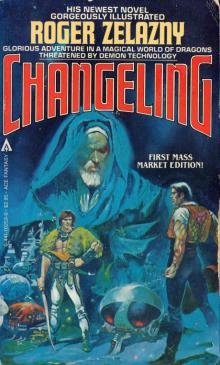 Changeling (Illustrated)
Changeling (Illustrated) Donnerjack
Donnerjack Shadows & Reflections: A Roger Zelazny Tribute Anthology
Shadows & Reflections: A Roger Zelazny Tribute Anthology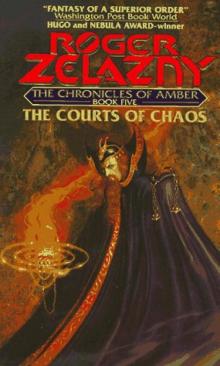 The Courts Of Chaos tcoa-5
The Courts Of Chaos tcoa-5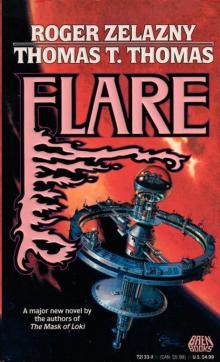 Flare
Flare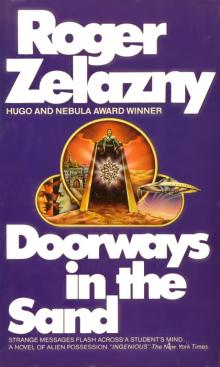 Doorsways in the Sand
Doorsways in the Sand The Great Book of Amber
The Great Book of Amber Home Is the Hangman
Home Is the Hangman For a Breath I Tarry
For a Breath I Tarry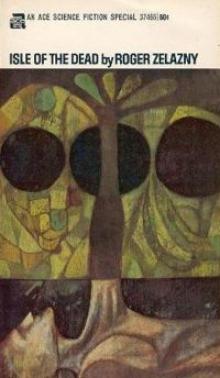 Isle Of The Dead
Isle Of The Dead Salesman Tale (amber stories)
Salesman Tale (amber stories) Dismal Light
Dismal Light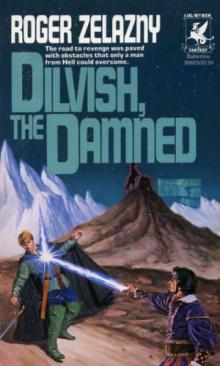 Dilvish, The Damned
Dilvish, The Damned The Black Throne
The Black Throne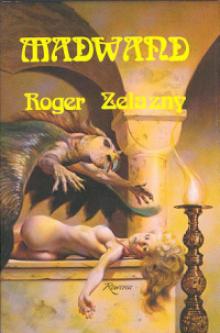 Wizard World 2: Madwand
Wizard World 2: Madwand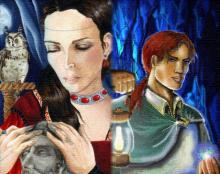 The Salesman's Tale
The Salesman's Tale